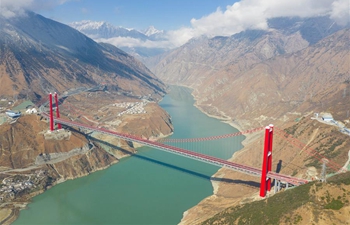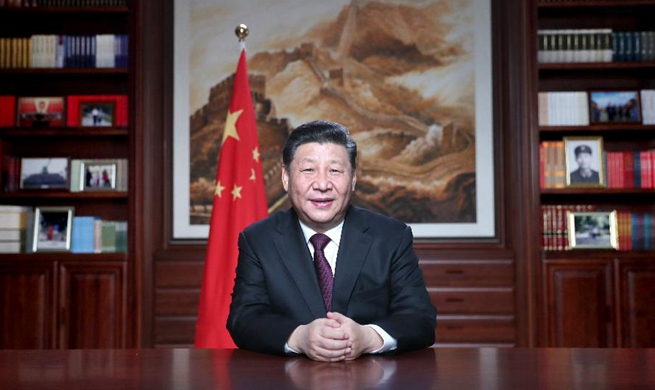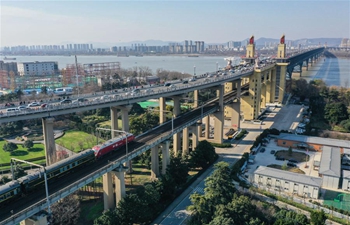TRIPOLI, Jan. 1 (Xinhua) -- The year of 2018 witnessed important security and political events in Libya, with no real agreement ending the political division that has plagued the country since 2014.
However, extremist and terrorist movements in recent months show the obstacles facing Libya's political scene in 2019.
CONTINUOUS RISK
"The Islamic State (IS) proved that it has a great ability to maneuver despite the loss of its stronghold in Sirte two years ago," said Farhat al-Badri, a researcher of terrorist groups affairs.
"IS carried out deadly attacks in the capital Tripoli that confused the government regarding the actual end of the threat of the extremist group in the country," al-Badri added.
"The extremist group launched three painful blows in Tripoli, targeting Libyan headquarters and interests, through which it sent a message to the Libyans and the international community that it has the ability to move and strike whenever it wants," al-Badri told Xinhua.
The researcher warned that IS has "proven that it has what it takes to carry out deadly attacks that undermine the confidence of the security services and make them feel like a target at any time."
IS launched a suicide attack in May on the headquarters of the Libyan Higher National Commission of Elections, killing more than 14 people and injuring dozens of others.
The headquarters of Libyan National Oil Corporation were also attacked in September and two people were killed.
In the last week of 2018, IS attacked the Foreign Ministry's headquarter in Tripoli, killing two people and injuring more than 10 others.
The extremist group also threatened to launch a series of continuous attacks in 2019 on Libyan institutions and army forces in the east and west of the country.
Iman Jalal, an university professor, said the security services affiliated with the Ministry of Interior suffer a great deal of corruption especially at the organizational level as well as overlap of tasks in the shadow of the militias.
"This is what makes the state's services lack harmony," she told Xinhua.
On Sunday, Libyan Interior Minister Fat'hi Bashagha said that the ministry is suffering from great financial and administrative corruption, "which must be fought and controlled."
The minister also stressed the need to rehabilitate all the members of armed groups to make them join the ministry.
During a joint press conference with Bashagha hours after a deadly suicide attack on the Foreign Ministry's headquarter, Foreign Minister Mohamed Sayala stressed the need to partially lift the international arms embargo on Libya in order to enhance security.
TERRORIZING OF INSTITUTIONS
The targeted institutions carry an important symbolism in addition to their vital importance, observers said.
"The Higher National Commission of Elections represents the path of stability in the country and the end of the transitional phase. The National Oil Corporation is the backbone of Libya's economy and its sole supplier," said political researcher Khalid al-Tarhouni.
"The Foreign Ministry holds the diplomatic hope for the return of foreign missions and embassies to the capital and for reaching a political solution to the conflict," he added.
According to al-Tarhouni, IS does not carry out suicide attacks without study. Instead, the attacks were aimed to inflict physical and human damage, and most importantly, a psychological fear.
"The recent attack on the Foreign Ministry was the worst and the most effective on Libya negatively," al-Tarhouni said.
He explained that a number of embassies and diplomatic missions were preparing to return to Tripoli at least during the first quarter of 2019, but all these plans were canceled because the attack revealed the depth of extremist and terrorist movements and threats.
Most foreign embassies and companies in Libya left the country in 2014 because of the violent clashes breaking out in Tripoli between rival armed groups, which led to the current political division in the country.
Sirte, located some 450 km east of Tripoli, had witnessed months of fighting between forces allied with the UN-backed government and IS militants, which ended in December 2016 with the government forces taking over the city.
The government said that IS remains a threat to the national security, despite the defeat in Sirte.
PROLONGING THE CRISIS
The recent terrorist attacks not only indicated that IS continues to pose a threat to the security and stability of the country, but also revealed the extent of the difficulties facing the political process in Libya.
Libya has been suffering insecurity, chaos and political division since the fall of former leader Muammar Gaddafi's regime in 2011.
Despite signing a UN-sponsored political agreement by the Libyan rival parties in 2015, Libya remains politically divided between eastern and western authorities, both competing for legitimacy.
Analysts agreed that the target of the Higher National Commission of Elections sends a message that holding elections faces major security and political difficulties, in light of the security failure against such attacks and the continued division between political parties.
Both France and Italy in recent months held conferences on Libya that aimed to end the Libyan political crisis. The country is preparing to hold a conference that gathers the political parties in January and also plans to hold a constitution referendum and elections in the spring of 2019.
However, the success of these plans remains dependent on overcoming obstacles facing the planned conference and elections, according to analysts.













